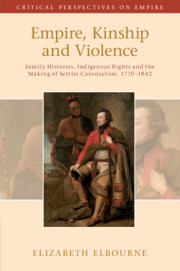 Empire, Kinship and Violence
Empire, Kinship and Violence Belonging and Un-Belonging in British-Haudenosaunee Borderlands
from Part I - North America
Published online by Cambridge University Press: 15 December 2022
In the context of a wider study of the evolution through time of relationships between Indigenous peoples, settlers and the British empire though the example of three family histories, this initial chapter starts in the borderlands between the lands of the Haudenosaunee and colonial New York just before the revolution. It re-reads the well-known histories of Haudenosaunee siblings Joseph and Molly Brant (Thayendenegea and Konwatsienni) and of British Superintendent of Indians William Johnson, Molly Brant’s partner, in a wider regional context. The chapter takes the Mohawk Valley as an example of a context in which the empire was compelled to accept to some extent the models of incorporation, including the creation of kinship links designed to foster mutual obligations, used by Indigenous people who were still key military allies. At the same time, William Johnson also used household power (including the ownership of enslaved people) to attempt to dominate a complex society. Before the Revolution, people in Mohawk Valley borderlands lived in a state of uneasy equilibrium, held together in part by the empire’s military need of an alliance with the Haudenosaunee, even as regional violence made relationships increasingly untenable.
To save this book to your Kindle, first ensure no-reply@cambridge.org is added to your Approved Personal Document E-mail List under your Personal Document Settings on the Manage Your Content and Devices page of your Amazon account. Then enter the ‘name’ part of your Kindle email address below. Find out more about saving to your Kindle.
Note you can select to save to either the @free.kindle.com or @kindle.com variations. ‘@free.kindle.com’ emails are free but can only be saved to your device when it is connected to wi-fi. ‘@kindle.com’ emails can be delivered even when you are not connected to wi-fi, but note that service fees apply.
Find out more about the Kindle Personal Document Service.
To save content items to your account, please confirm that you agree to abide by our usage policies. If this is the first time you use this feature, you will be asked to authorise Cambridge Core to connect with your account. Find out more about saving content to Dropbox.
To save content items to your account, please confirm that you agree to abide by our usage policies. If this is the first time you use this feature, you will be asked to authorise Cambridge Core to connect with your account. Find out more about saving content to Google Drive.